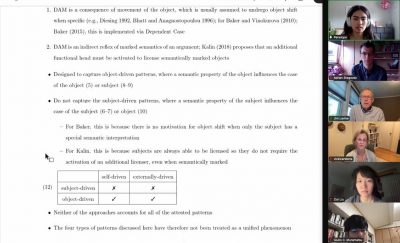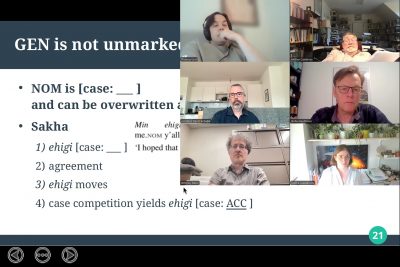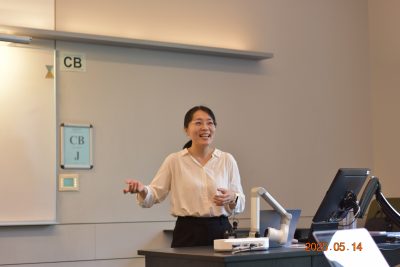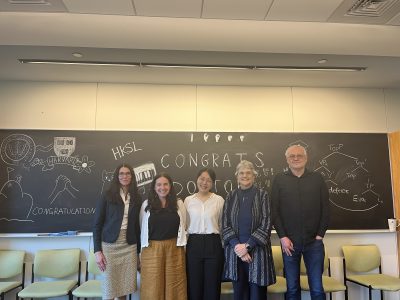Diane Lillo-Martin and Shuyan Wang will present a poster, titled “Children’s online processing of scalar implicatures”, at the 2025 edition of the conference on Cross-linguistic Perspectives on Processing and Learning (X-PPL 2025), hosted by the University of Zurich, September 1st-2nd 2015.
Author: Adrian Stegovec
Xu and Wang | Languages
Ting Xu (PhD 2016, now at Tsinghua University) and Shuyan Wang (PhD 2022, now a post-doc at UConn) have published an article in the journal Languages, titled “On the Acquisition of English Complex Predicates and Complex Word Formation: Revisiting the Parametric Approach”. Congratulations Ting and Shuyan!
Abstract: Languages vary in their availability of productive endocentric bare-stem compounds (e.g., flower hat) and a range of complex predicates (separable verb-particles, double object datives, adjectival resultatives, put-locatives, make-causatives, and perceptual reports). To account for these cross-linguistic variations, two parameters have been proposed: the Compounding Parameter (TCP), which governs the formation of bare-stem compounds, separable verb-particles, and adjectival resultatives, and the Small Clause Parameter (SCP), which determines whether a verb can take a small clause complement. These parameters make testable predictions about children’s acquisition. If TCP and SCP are on the right track, we would expect correlations in the acquisition of structures governed by each parameter. This study examines these predictions by analyzing longitudinal corpora from 23 English-speaking children, assessing both the correlation between the acquisition of different structures and their acquisitional ordering. Our findings support both TCP and SCP, confirming that the acquisition of bare-stem compounds is closely associated with that of separable verb-particles, while the acquisition of (some) complex predicates is related. In addition, our results offer new insights into the potential triggers that children use to set each parameter. These findings contribute to our understanding of language variation and the role of parameter setting in first language acquisition.
Kaufmanns | Invited talks in Tokyo and Sapporo
Magdalena Kaufmann and Stefan Kaufmann gave a series of invited talks in August:
- Stefan Kaufmann gave two lectures on “Probabilistic Semantics for Modality and Conditionals” at Ochanomizu University, Tokyo, on August 5 (co-hosted by Daisuke Bekki, Ikumi Imani, and UConn alum Teruyuki Mizuno, PhD 2023)
- Magdalena Kaufmann and Stefan Kaufmann each gave a talk at a workshop on “Future Developments in Formal Semantics” at Sapporo City University, Sapporo, August 18-19:
- Magdalena Kaufmann. Perspectives on Modals
- Stefan Kaufmann. Import/Export and Other Conditional Invalidities
Daniel Defense
Penelope Daniel successfully defended her doctoral dissertation titled Building a DAM: Parameters of differential argument marking on July 7th.
Penelope will be starting her job as a postdoctoral associate in syntax at the University of Maryland in the fall.
Congratulations, Penelope!
Penelope defending:

Dr. Daniel preparing for the toast after the successful defense:

Dr. Daniel celebrating with her committee:

The online audience at the defense:

Stegovec mini-course at UNG
Adrian Stegovec taught a mini-course at the University of Nova Gorica – Center for Cognitive Science of Language, between 17th June and 1st July, titled “Restrictions on the order and (co-)occurrence of clitic pronouns: From Slovenian to the world and back again”. The course consisted of five lectures:
- Setting the stage: Restrictions on the order and (co-)occurrence of clitic pronouns
- Person-based restrictions on Slovenian clitics: PCC or not PCC?
- A typological investigation of person restrictions
- A typological gap and why it’s there
- Finding the source of person restrictions
UConn Linguistics at JK
The 32nd Japanese/Korean Linguistics Conference, organized by Cornell University, took place on June 13-15, 2025. UConn was represented at the conference with talks by:
- Qiushi Chen. On the dual status of -e- in Old Japanese verbal morphology
- Xuetong Yuan (PhD 2024, now at University of Chicago). Evaluativity and practicality in conditionals: the case of tewa
Laszakovits Defense
Sabine Laszakovits successfully defended her doctoral dissertation titled On the fundamental difference between dependent-up and dependent-down cases, and on their manifestation in Turkic on June 17th.
Congratulations, Sabine!
Sabine defending “in front of” most of her committee:

Dr. Laszakovits with the committee and audience after the successful defense:

Gan Defense
Linghui ‘Eva’ Gan successfully defended her doctoral dissertation titled Information Structure of the Clause-Final Position in Hong Kong Sign Language on May 14th.
Congratulations, Eva!
Eva defending:

Dr. Gan with her well-earned cake:

Dr. Gan with her committee:

Arano Defense
Akihiko Arano successfully defended his doctoral dissertation a while ago on April 30th. The dissertation was titled Expanding the scope of scrambling.
Congratulations, Aki!
While the traditional cutting of the defense cake was not possible due to the event being fully online, we hope Dr. Arano instead enjoyed a well-earned Japanese treat of his liking.
Stegovec at BieLeiCos
Adrian Stegovec gave an invited talk, titled On the correlation between pronoun type and person restrictions at the Bielefeld-Leiden Comparative Syntax Conference 2025 (BieLeiCos) which took place on May 22nd-23rd at Bielefeld University, Germany.